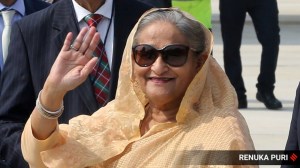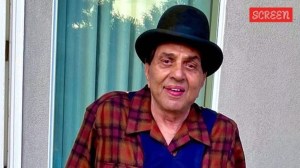Dr Do Little?
Our image of Manmohan Singh as a prime minister has always been governed by two contradictory impulses....

Our image of Manmohan Singh as a prime minister has always been governed by two contradictory impulses: the prime minister we wish he might still become, and the prime minister he actually is. Recent opinion polls show relatively high approval ratings for the PM. But it is always difficult to know what to make of this. There was a time, not so long ago, when Vajpayee could do no wrong both in the eyes of the media and opinion polls. But in the end what it all amounted to remains unclear. But putting polls aside, it is fair to say that for the most part, it is the PM’s weaknesses that have dominated public discussion. The sense that he was not his own man, that he could not make his writ run even within the supine corridors of the Congress Party and that he was incapable of making any politically tough decisions, seems to define his leadership. It was an appallingly shameful moment in the history of Parliament when legislators drowned out his statement on the Indo-US nuclear deal. But it was also an emblematic moment in a double sense. It was as if someone was saying, “Who listens to you, Mr Prime Minister?” But it was also a reminder of why people still hitch their wishful star to the PM. He may be weak, but when you contemplate the narcissistic, self-serving and hooligan behaviour of most legislators it is hard not to wish the PM well, if not sympathise with him.
It is in this context that the PM’s standing up to the Left has acquired exaggerated significance. Many are hoping that the PM they wish for has finally arrived. But while his standing up to the Left is creditable, it would be yet another instance of wishful thinking to see any larger significance in this assertion of power. There is a sense in which the PM is playing a strong hand. There are things the Left cannot afford to do. First, it has always boxed itself into a corner by insisting that something must be wrong, simply because the BJP says it. The fear of the BJP’s convictions has always trumped its own courage. The Left also knows that bringing down the government on this issue is unlikely to give it any political dividends. The issue may affect its ideological posturing but it does not involve alienating its core constituencies like organised labour. At most it positions the Left to curry the favour of UNPA, whose views on this matter have nothing to do with considered foreign policy options. It can still do the unthinkable; but the incentive structure militates against the likelihood of it taking drastic action. After all, they have never had it so good.
But it could be argued that the PM calling the Left’s bluff on this issue only deepens the mystery about his lack of assertion elsewhere. Reading his Independence Day address heightens these doubts. The sentiments he expresses and some of the challenges he articulates are unexceptionable: who, in their right minds, can be against investment in agriculture, education, a social safety net and transparency in government? But the speech frankly reads like a civil servant’s power point presentation on various programmes rather than a vision statement from someone capable of strong action. More worryingly, in certain key sectors like education, the spending programme seems to be linked to the wrong strategy. For example, there is the call to create 30 Central universities in states that don’t have any; there is a massive spending programme for vocational education. But there is nowhere even the slightest hint that the PM can look the nation in the eye and promise that he can take the necessary action to ensure that he has a truly effective strategy which matches ends and means, outlays and outcomes.
Let us look at the speech in its own terms. The problem with education some might say is that the PM cannot take on Arjun Singh, and attack the real problems of governance and quality in higher education. The problem with agriculture is that Sharad Pawar has woken too late in the life of this government. The weakness of local government is that we will not take the steps necessary to truly revolutionise local government and protect it from erosion. The problem with NREGA is not the premise; it is its links to an overall development strategy. The obstacle to urban renewal is that radically restructuring the relationship between the states and urban bodies is not even on the agenda; Bharat Nirman’s progress is at best uneven. RTI was a good beginning. But none of the administrative reforms he rightly promised are going to happen. The PM’s ability to take on the cussed security establishment on even trivial matters like visas for foreign scholars, let alone larger issues like Siachen, remains limited. There can be no doubt about the PM’s record on communalism, but whether he can prevent his own party from being lackadaisical in the defence of liberty, or overcome a politics of divisiveness remains to be seen.
The list of issues the PM flagged concentrates on the spending side. Admittedly a speech should not cover everything, but its omissions in terms of controversial reforms are striking. If anything, the speech is not so much an evidence of concern for those who have been excluded. Rather the speech is evidence that the PM is taking the politically and administratively easy route out on almost every single issue that he has flagged. It is almost as if a doctor, having diagnosed a serious illness, prescribes only nice-tasting cough syrup — not because it will cure the disease but because it will taste sweet.
Just as the Indo-US nuclear deal will be judged by the larger context and the follow-up actions we undertake, so will this episode of the PM’s standing up to the Left. There is no evidence that standing up in the case of the nuclear deal is about anything more than standing up in the case of the nuclear deal. The PM’s historic 1991 speech referred to Sarfaroshi ki tamanna ab hamare dil me hein. This rhetorical register is now strikingly absent. And he has to convince that sarfaroshi will be for more than 123; and katils other than the Left can be taken on.
The writer is president,Centre for Policy Research





- 01
- 02
- 03
- 04
- 05


























